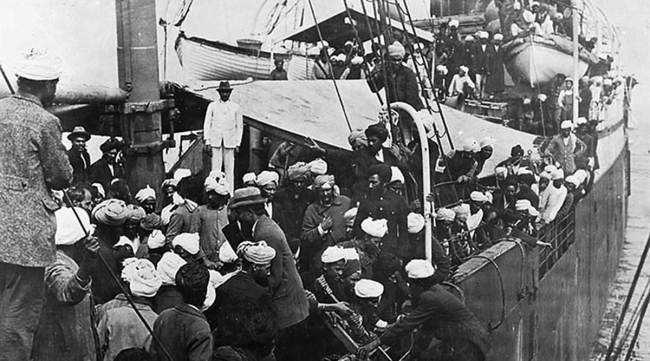Opinion Komagata Maru tragedy: Saying sorry isn’t enough to address colonial oppression
As we mark the 108th anniversary of the infamous Komagata Maru incident, there is a need to revisit the notion of healing, and the pain of this colonial massacre
 In The Journey of the Komagata Maru: The Sikh Challenge to Canada's Color Ban (1979), Hugh Johnston wrote that Komagata Incidents continues to reverberate in Canadian politics and the gurdwaras of Punjab.
In The Journey of the Komagata Maru: The Sikh Challenge to Canada's Color Ban (1979), Hugh Johnston wrote that Komagata Incidents continues to reverberate in Canadian politics and the gurdwaras of Punjab. Written by Raja Choudhary and Harinder Happy
Today, as we mark the 108th anniversary of the infamous Komagata Maru incident, there is a need to revisit the notion of healing, and the pain of this colonial massacre. The Komagata Maru incident is a tragic tale of imigrants from British India who traveled across oceans, in search of a better life. The steamship Komagata Maru, carrying 337 Sikhs, 27 Muslims, and 12 Hindus sailed to Vancouver’s harbor in Canada on May 23, 1914, where the colonial rulers denied them entry. The Canadian military was forced to sail the ship back to Budge-Budge, India, where 19 passengers were reportedly shot dead, others were imprisoned, and the fate of many remains unreported.
Sardar Gurdit Singh, one of the primary figures in the Komagata Maru episode, was imprisoned in Canada under the exclusion law. After his release from prison, he remained underground until 1920. While the British government filed its “Reports of the Komagata Maru Committee of Inquiry”, Singh wrote his side of story — Zulmi Katha in Punjabi and Voyage of Komagatamaru: India Slavery Abroad — which exposed the dark history of the incident.
In The Journey of the Komagata Maru: The Sikh Challenge to Canada’s Color Ban (1979), Hugh Johnston wrote that Komagata Incidents continues to reverberate in Canadian politics and the gurdwaras of Punjab. About 102 years after the Komagata tragedy, Canada’s Prime Minister Justin Trudeau made an official apology in 2016.
What is the significance of this overdue apology? While colonialism formally ended about 75 years ago, and India is now celebrating “Azadi Ka Amrit Mahotsav”, its consequences remain a challenge. Its impact can be seen in the judiciary, executive and legislature in post-colonial India.
The Indian community and other colonised countries are currently battling the repercussions of colonialism on numerous global platforms. As a result, in addition to Trudeau, former British PMs David Cameron and Theresa May also apologised for the Jallianwala Bagh Massacre. The Archbishop of Canterbury too paid tribute to the martyrs at Jallianwala Bagh and apologised for the “unforgotten” massacre.
Indian representatives have also discussed the issue on international platforms. In 2015, the Oxford Students Union hosted on whether Britain owes India reperations. Shashi Tharoor pushed for a comprehensive apology from the British government. One Indian commentator calculated, based on Tharoor’s comments, that an acceptable amount of reparations may be around Rs 270 lakh crore, which would be greater than the UK’s GDP in 2015. External Affairs Subrahmanyam Jaishankar laimed that India endured two centuries of humiliation at the hands of the West in its predatory, and argued that the British extracted $45 trillion in current value from India (October 2019).
Is apologising enough? As R L Brooks argues in his 1999 book , When Sorry Isn’t Enough: The Controversy Over Apologies and Reparations for Human Injustice, “an apology is acceptable, but justice is preferable”. India should demand complete justice through economic reparations.
The 15 members of the Caribbean Community and Common Market (CARICOM) have demanded that European governments “fully apologize” for their role in the slave trade and repatriate descendants of forced migrants. CARICOM members also threatened to bring former colonisers before the International Court of Justice. India should rally South Asian nations in a similar manner. This action will strengthen regional collaboration and contribute significantly to India’s “Look East” foreign policy.
An actual memorial to the martyrs of the Komagata Maru and the freedom fighters of India will continue to recall the tragic history of colonialism and remind people that colonialism continues to exist in various forms. The Canadian PM’s apology is insufficient. The Komagata Maru episode will always be remembered whenever colonial and post-colonial injustice is spoken of.
Choudhary is at SOAS, University of London, and Happy is a PhD scholar at Jawaharlal Nehru University, New Delhi





